
-
How to Respond to Bad Reviews — Comment Processing Algorithm
-
How to Prevent Controversial Situations Leading to Conflicts and Negative Reviews
Practically every business owner has encountered situations where users give a one-star rating and write unjust negative reviews on independent platforms, such as Facebook or Google Maps. Naturally, the initial reaction is, "Why? We've done everything right, haven't violated any rules, and haven't deceived anyone!" The problem goes beyond the fact that the negative rating was undeserved; it also adversely affects the business's reputation and discourages potential clients.
Let's delve into how to handle a "one-star" review, whether it's possible to eliminate it, and ways to prevent misunderstandings that may lead to negative comments. Understanding the origins of undeserved negative ratings and comments is essential.
The Origins of Undeserved Poor Grades and Comments
If we specifically discuss unjust reviews, they mainly arise for two reasons:
-
1. The customer misunderstood the nature of the service or product and believed they were deceived.
-
2. Competitors intentionally hired bots to tarnish the rating.
In the first scenario, the misunderstanding is compounded by human factors — bad mood or personal problems can lead a person to "spiral" the situation. What could have been a minor issue solvable with managers turns into a scandal with the aftermath of angry comments.
Identifying a bot attack is straightforward — they generate numerous comments instantly, often reaching into the dozens. In such situations, attempts to engage in communication with the commentators may prove futile; it's better to focus efforts on minimizing the consequences.
Of course, we, too, have faced misunderstandings and undeserved negative reviews. We have developed a strategy for ourselves — how to respond to bad reviews and what is best to avoid. Let us share this strategy with you, starting with scenarios that are best not to escalate.
Read also: Fakes and disinformation: learning to recognize false information on the Internet
How to Ruin Your Reputation Completely — Harmful Advice
We present these recommendations in the form of harmful advice so that you can see from the outside what too hasty emotional decisions can lead to.
Quarrel with the Commenter
Emotions are running high, and indignation is boiling over! Tell the commenter who they are and what they're worth. Add that they are foolish and misunderstood the rules of service provision, and working with such clients is self-disrespect. Let them go to hell.
For those who have reached zen — calmly and thoughtfully prove to the commenter their wrongs, engage in a lengthy debate in the comments, spend several hours on it. Tire them with arguments and your stubbornness, as hired competitor bots are programmed to understand your position. Yes, of course.
If serious: Usually, such commenters are either nervous and unwilling to listen to the opponent or simply don't care about what they write because they were paid for the comment. It happens that an outraged person "deceived" begins to gather relatives and friends to write angry comments, and they will always be on the side of their close person, not yours. So, trying to prove something, explain, or worse, emotionally quarrel, is a good way to further ruin your reputation.
Start Apologizing, Offer a Discount, or Gift
Remember the postulate "the customer is always right" and start apologizing, even if you're not at fault. Offer discounts, send a gift. Never mind that the commenter is angry at the whole world, and your service or product was actually of high quality. Apologize with all your might!
If serious: It's one thing to apologize if you have genuinely made a mistake, even for a large business with a well-structured structure. In such cases, it is indeed necessary to compensate the client with money or send a gift. However, when it comes to toxic commenters or bots, you should not apologize. By doing so, you show everyone reading the correspondence that you are willing to reward unwarranted attacks. Moreover, if management takes the side of toxic clients, employees' motivation to work will decrease, and they will be disappointed in corporate ethics.
How to Respond to Bad Reviews — Comment Processing Algorithm
Here, we provide recommendations that will help minimize the consequences of an attack on your company's reputation. They apply to cases on all external platforms where reviews can be left.
Respond to the comment promptly; don't ignore it. Swift interaction with users improves the company's reputation.
-
Don't take everything to heart and don't succumb to emotions. There will always be dissatisfied people or competitors who would like to ruin your reputation; you just need to accept it and not waste your nerves.
-
Write a reply comment. But focus not on seeking understanding with the commenter but on other people who may read the conversation. Rational customers understand that bad comments don't always arise due to the company's fault. Politely and calmly describe the situation, explain that you provided quality services or products, and that the complaints have no real basis. It's better not to respond to subsequent emotional outbursts from the commenter and avoid getting involved in arguments.
-
In the case of bots or "victimized" relatives, the comment remains from a non-client, a third party. To clarify this, ask for the phone number, email address, or account ID from which the service or product purchase was made. After checking, write that services were not provided and the product was not shipped (if that's the case). This action is also directed at other people reading the thread; they will understand that the comment is untrue and created by someone who did not actually use the services. This tactic does not work everywhere — for example, it is not suitable for cafes or restaurants. In situations with online stores and digital business, it's easier. For example, a customer ordering hosting, a virtual server, or another service provides their contact details during registration and has their customer ID. With this information, all actions and inquiries — or their absence — can be easily tracked.
-
Write a letter to the support service of the website where the review was left and ask for its removal. Provide all evidence that the comment is not truthful and is slander. Sometimes, people driven by emotions may blame the company for all mortal sins. For example, someone once wrote about Cityhost that we support Putin and cheer for the "Russian world" - this thesis can easily be refuted by dozens of publications in the media about our pro-Ukrainian position and corresponding activities.
How to Remove Bad Reviews from Google Maps
In this section, we will tell you how to remove bad reviews about a business on Google Maps — it is difficult, but it is possible. There are a couple of ways to do it.
File a Complaint on the Comment
1. Go to Google Maps and open the comments for your business.
2. Find the "three dots" in the upper right corner of the review and click on them.
3. In the dropdown menu, select "Report."
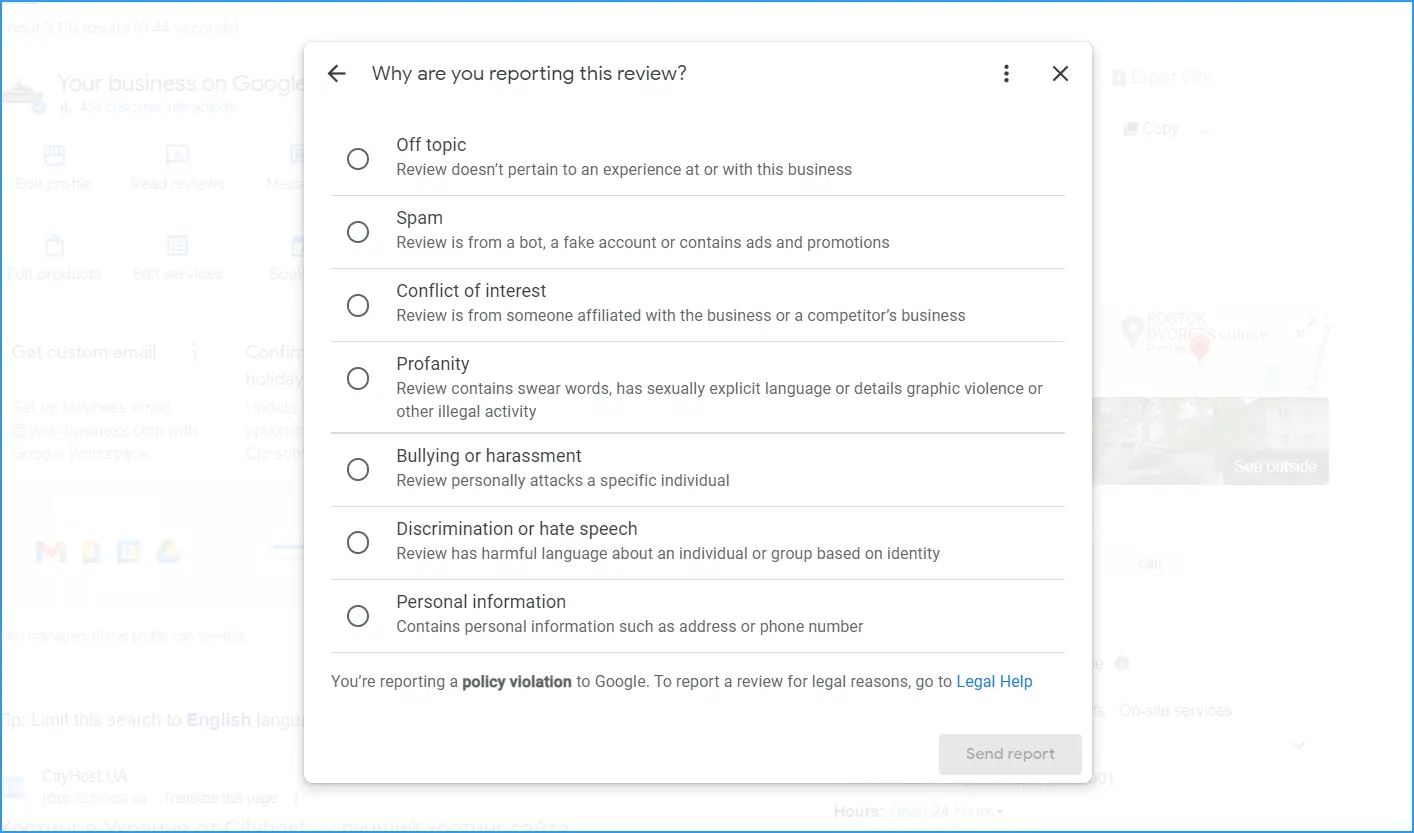
Choose one of the suggested options:
-
The review is off-topic — it does not contain specific remarks about the company's performance or mentions services you do not actually provide.
-
Spam — a fake account was used for the review or it contains advertising.
-
Conflict of interest — if the review was written by a competitor's employee.
-
Bullying or aggressive actions — the text shows signs of bullying, threats, or offensive language.
-
Discrimination or hostile statements — the review contains insults based on certain categories of people (nationality, religion, gender, etc.).
-
Personal information — the comment includes personal address or other data without the owner's consent.
Write to Support
To write to support, go to your business account and click on the three dots next to the company name. In the dropdown menu, select "Send feedback."
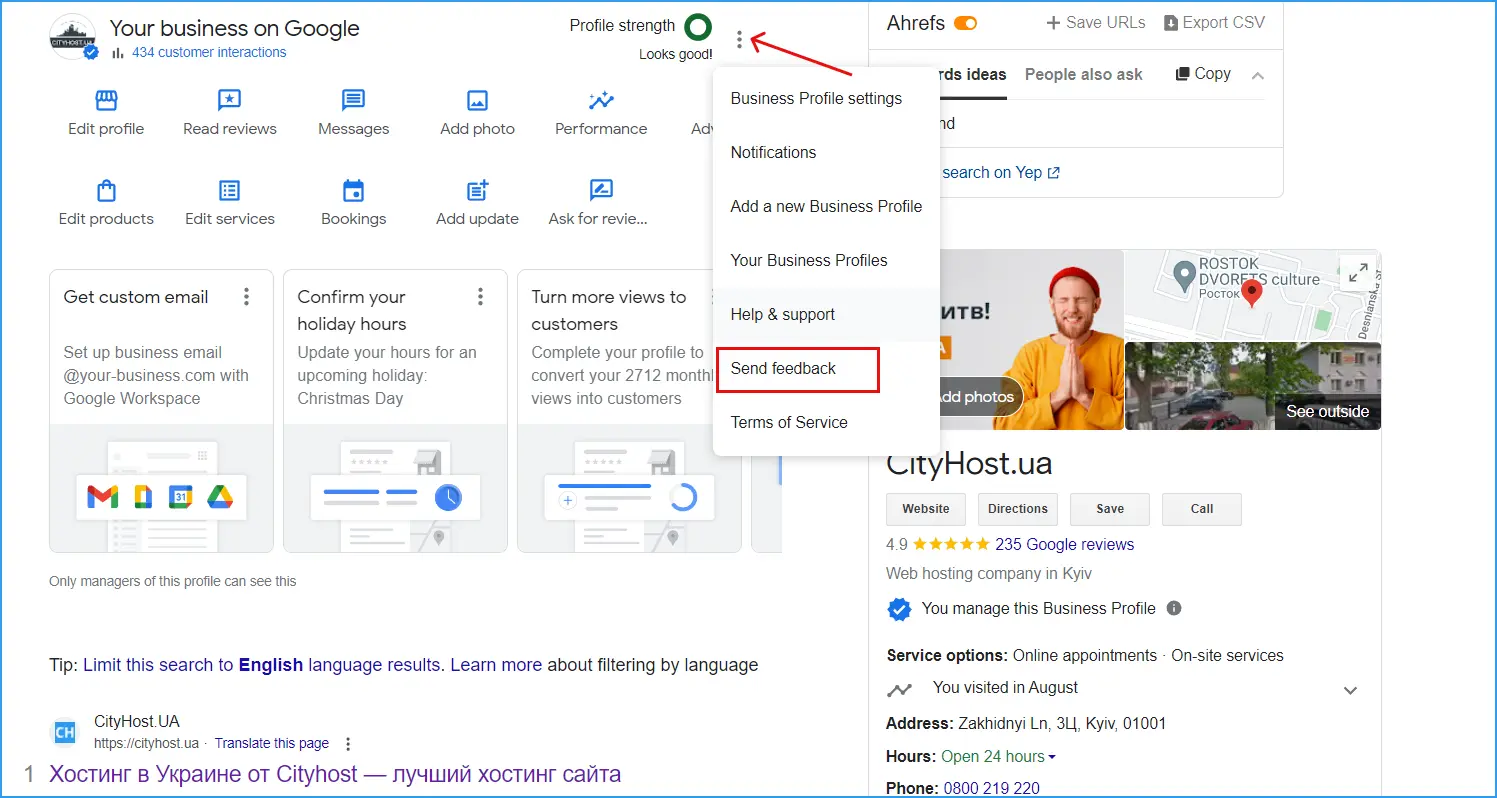
Then click on "Report an issue."
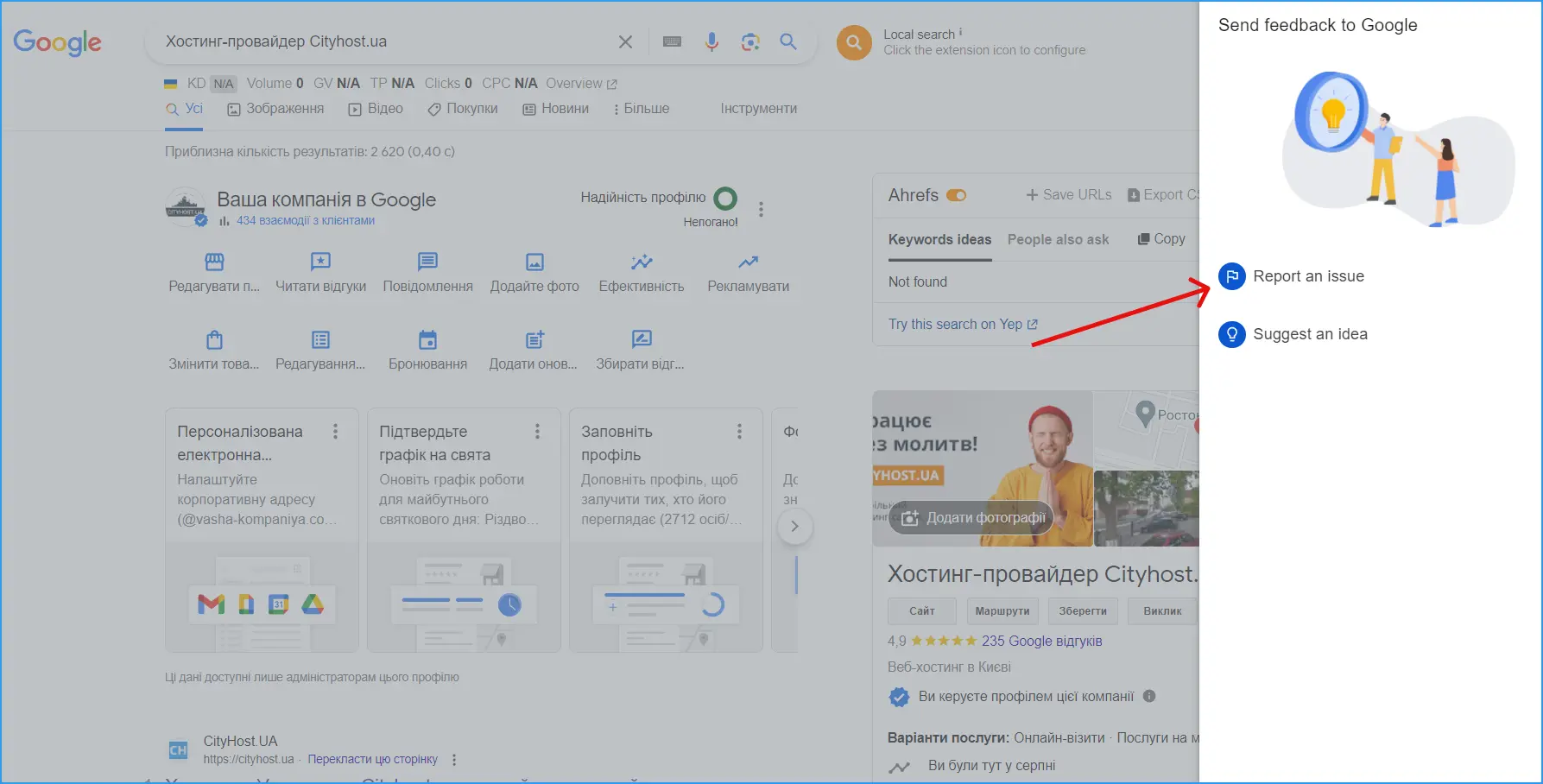
In the next window, select "Manage review removal." Fill in all the fields, describe the problem, add screenshots, and submit the request to the managers.
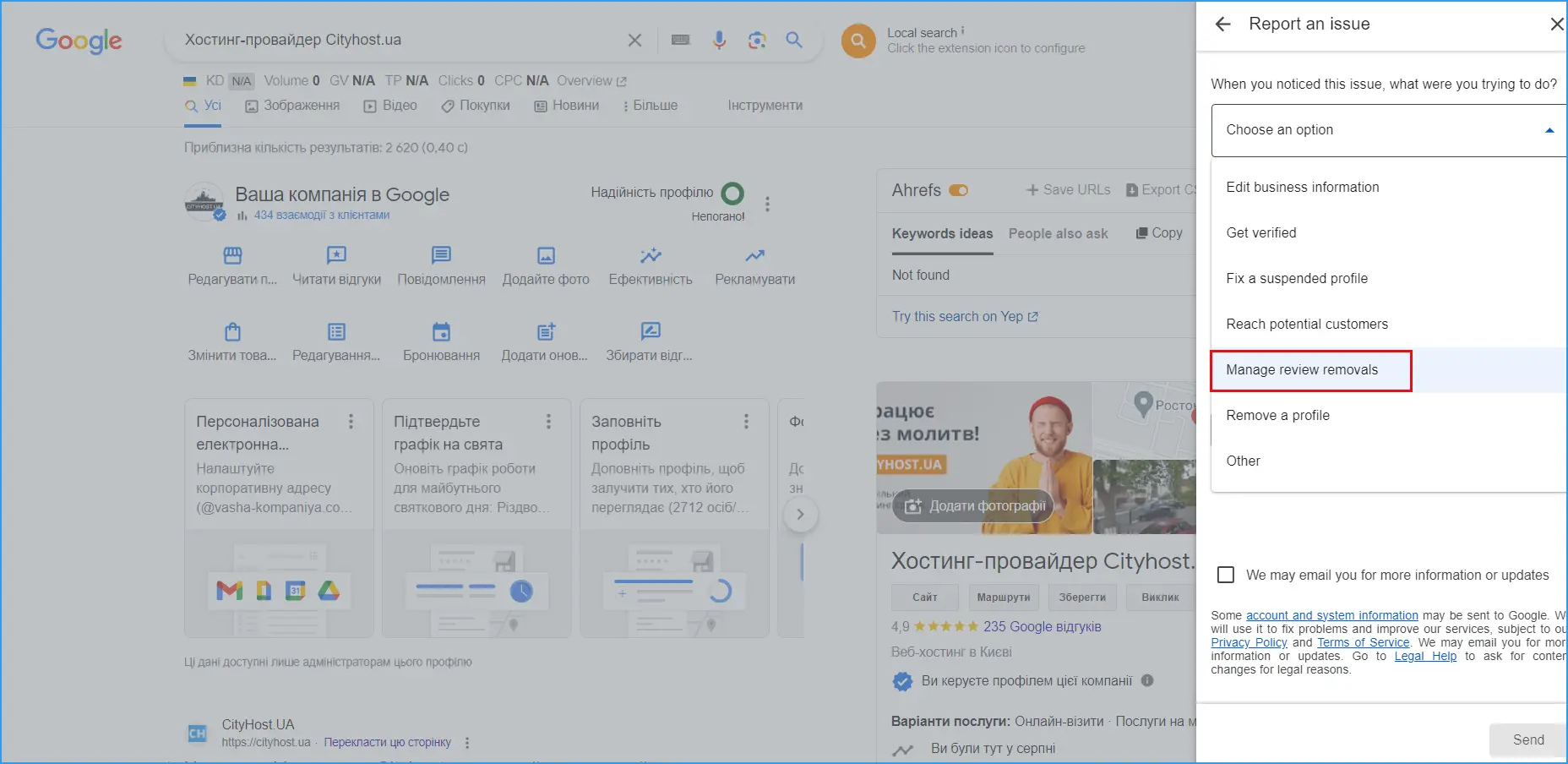
Google does not always remove reviews based on business owner requests, but there are chances, so it's advisable to use all available options.
How to Remove a Review on Facebook
On Facebook, you can also attempt to remove a review, although it doesn't always work here either. To do this:
1. Go to the "Reviews" section and click on the "three dots" next to the feedback you want to dispute.
2. Choose "Report this post."
3. Specify the reason for considering this comment unacceptable — most likely, it will be "Spam" or "Hostile statements."
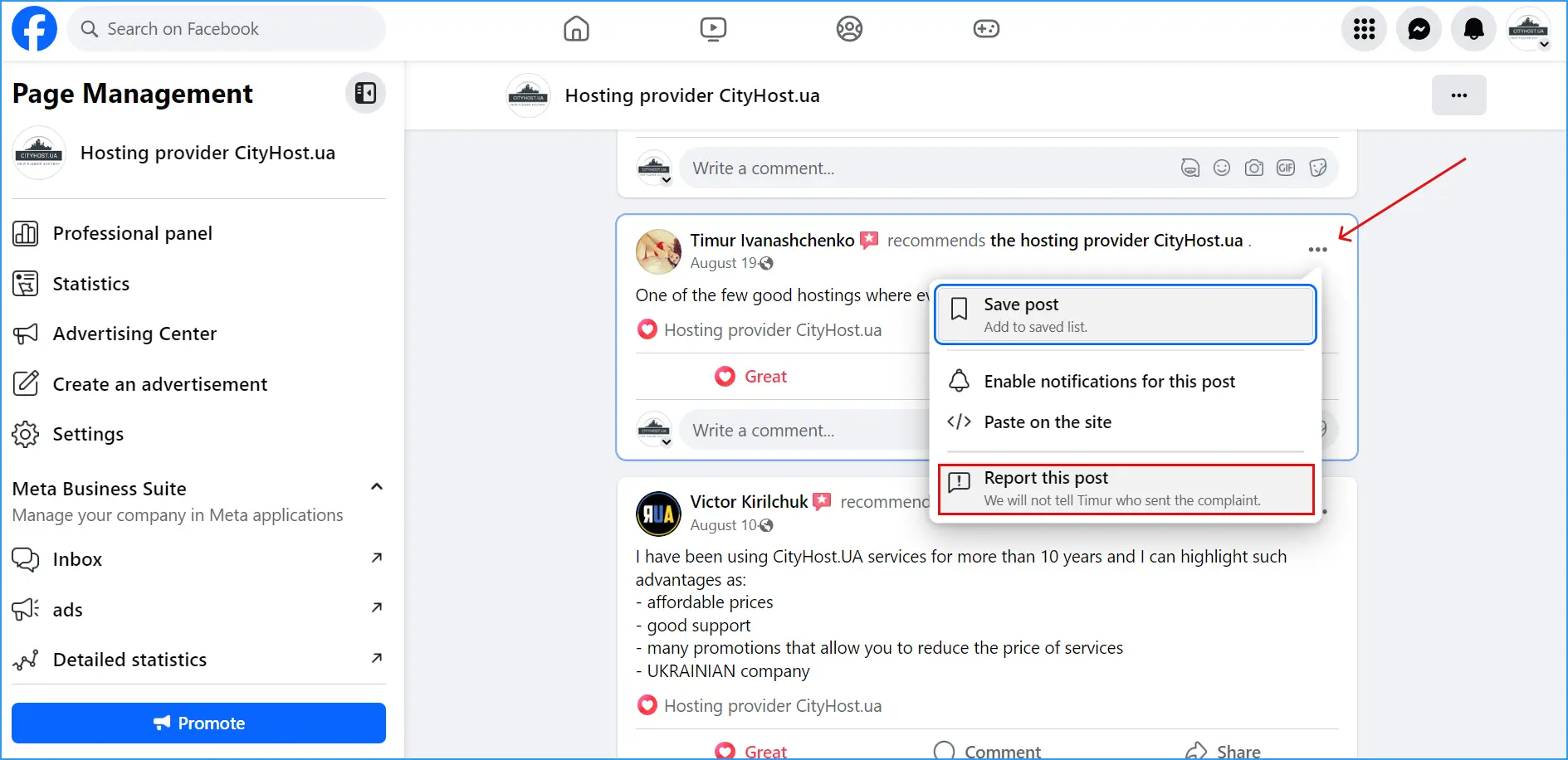
In the form, you cannot write anything; you just click buttons, making it impossible to inform support why the specified review should be removed. Therefore, respond to the commenter beforehand and describe the situation from your perspective. Moderators will see your response and take it into account.
However, there are cases where a competitor's bots flooded the account with "ones," and the social media moderators do not respond to your complaints. In such situations, it is sometimes easier to create a new page for your business than to try to fix the situation.
How to Prevent Controversial Situations Leading to Conflicts and Negative Reviews
Misunderstandings and emotional reactions are sometimes caused by discrepancies in the text or images related to a service or product. They can be perceived differently, and clients may invest completely different meanings. For example, warm daylight or cold office lighting can change colors in photos. A client thinks they ordered a beige sofa (as it seemed to them), and they receive a white one – and they start getting nervous because they received something different from what they ordered.
To protect yourself and clients from such situations, follow specific rules:
-
Craft visual and textual messages to be read unambiguously and not mislead clients. Avoid excessive Photoshop use; do not try to improve the product beyond recognition. Test product cards or social media posts on acquaintances or colleagues. Make sure people see exactly what you offer and do not harbor unnecessary illusions.
-
If a situation has already occurred, find out the reason for the misunderstanding and reformat the ad's text or image.
-
Highlight specific rules for providing services, which are most often the source of misunderstandings, and describe them in blog articles or social media posts. Draw clients' attention to these points. For example, Cityhost users sometimes hope that our technical support will be responsible for a site's positions in search engines or remove viruses from the site. This is not within our competencies, as stated in the service provision rules. To prevent users from having unnecessary expectations, we additionally write articles in our blog explaining how our technical support works, debunking myths about hosting provider services, and explaining users' responsibilities for server use.
-
Share as much information as possible about your services and products on social media — create videos on how to use them correctly, what mistakes to avoid. This will increase the amount of useful content on your pages and minimize unpleasant situations.
Cyberbullying is a phenomenon that can affect any business, even the most responsible and honest. It is like a weather phenomenon that is difficult to predict. You can partially prevent its negative impact and try to minimize the consequences.
If you are facing cyberbullying for the first time, the main thing to remember is that it happens to everyone, and it is not a sentence for your business. Prepare an algorithm for responding to negative comments, do not panic, and do not take such cases too close to heart, and then you will be able to navigate this adventure with a clear head.









